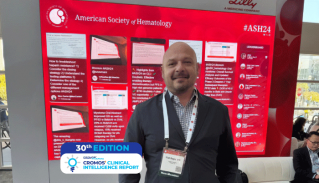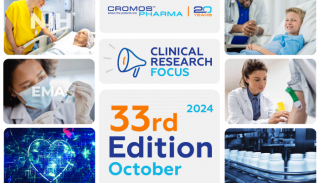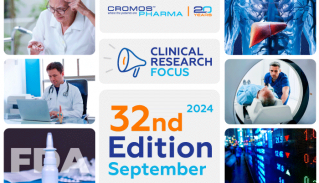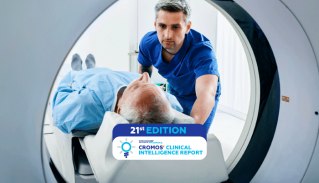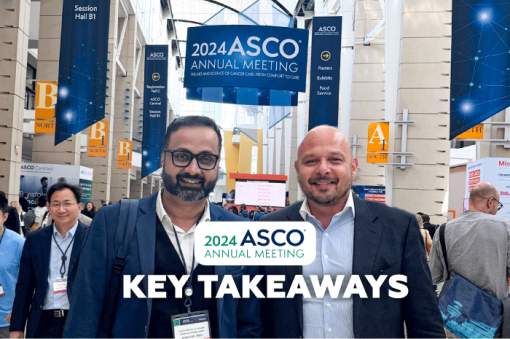
Key Takeaways From The 2024 ASCO Annual Meeting
The 2024 ASCO Annual Meeting has once again proven to be a cornerstone event in medical science, showcasing groundbreaking research and clinical advancements that are set to transform cancer treatment and patient care. The meeting featured an overwhelming array of groundbreaking studies and discoveries across various cancer types and treatment modalities. While it is impossible to cover all the significant research presented at this esteemed forum, this summary highlights a few of the most notable studies that have the potential to affect treatment approaches and improve patient care. This year, I have categorized the discoveries into three main areas: hematologic malignancies, solid malignancies, and patient care.
HEMATOLOGIC MALIGNANCIES
Advancements in Hodgkin Lymphoma Treatment
Trial: HD21
Key Findings:
- Regimen: BrECADD vs. escalated BEACOPP
- 4-year progression-free survival: 94.3% with BrECADD vs. 90.9% with BEACOPP
- Reduced toxicity: Lower hematologic and reproductive toxicity
Conclusion: BrECADD shows promise as a new standard of care for advanced Hodgkin lymphoma
Promising Results in CML
Study: ASC4FIRST
A phase 3 trial has revealed encouraging results for the combination of asciminib with standard tyrosine kinase inhibitors (TKIs) for the first-line treatment of chronic myeloid leukemia (CML). Asciminib, a BCR-ABL1 inhibitor targeting the ABL myristate pocket, showed a statistically significant improvement in both efficacy and safety compared to traditional TKIs.
Key Findings:
- Major Molecular Response (MMR) Rates: At 48 weeks, asciminib achieved a 68% MMR rate compared to 49% for other TKIs.
- Deep Molecular Response (MR4): 39% of patients on asciminib reached MR4, compared to 21% on other TKIs.
- Safety and Tolerability: Only 5% of patients discontinued asciminib due to toxicity, versus 10% for other TKIs.
Conclusion: These results suggest asciminib may become the preferred standard of care for CML, offering better outcomes and fewer side effects.
Advancements in Multiple Myeloma Treatment
Trial: IMROZ study
Key Findings:
- Regimen: Isa-VRd (isatuximab, bortezomib, lenalidomide, dexamethasone) vs. VRd (bortezomib, lenalidomide, dexamethasone)
- Progression-free survival: 63% with Isa-VRd vs. 45% with VRd alone
- Minimal residual disease negativity: Higher rates with Isa-VRd
Conclusion: Isa-VRd is a potential new standard of care for newly diagnosed multiple myeloma patients not eligible for transplant
SOLID MALIGNANCIES
Metformin in Prostate Cancer
Trial: MAST study
Key Findings:
- Population: Low-risk prostate cancer patients under active surveillance
- Result: Metformin did not affect pathologic or treatment progression
Conclusion: Metformin should not be used in low-risk, localized prostate cancer patients eligible for active surveillance
Breakthrough in ALK-Positive NSCLC
Study: CROWN
The updated results from the CROWN study highlight the long-term benefits of lorlatinib, a third-generation ALK inhibitor, for patients with previously untreated advanced ALK-positive non-small cell lung cancer. The study compared lorlatinib to crizotinib, showing substantial improvements in progression-free survival (PFS).
Key Findings:
- Median PFS: At 60 months, the median PFS was not reached for lorlatinib, while it was 9.1 months for crizotinib.
- PFS Rate at 60 Months: 60% for lorlatinib versus 8% for crizotinib.
- Brain Metastases Control: 92% of patients on lorlatinib remained progression-free at 60 months.
Conclusion: These unprecedented results confirm lorlatinib’s efficacy, particularly in controlling central nervous system metastases and extending PFS across all patient subgroups.
THIO and Checkpoint Inhibitor Combination for NSCLC
Trial: THIO-101 study
Key Findings:
- Disease Control Rate (DCR): 85% with THIO and Libtayo in NSCLC patients who failed two or more standard-of-care therapy regimens.
- Primary Objectives: Safety and tolerability of THIO, and clinical efficacy measured by overall response rate (ORR).
Conclusion: THIO combined with Libtayo shows significant disease control in advanced NSCLC patients, indicating a promising new treatment approach for those who have exhausted other options.
Avelumab in TNBC
Trial: LBA500 – A-BRAVE trial
Key Findings:
- Intervention: Avelumab vs. observation post-treatment
- Result: Non-significant improvement in disease-free survival; significant improvement in overall survival
Conclusion: Avelumab shows potential for improving survival in early TNBC patients at high-risk post-surgery
Frontline Treatment of Advanced Renal Cell Carcinoma
Trial: JAVELIN Renal 101
Key Findings:
- Intervention: Avelumab plus axitinib vs. sunitinib
- Result: Improved progression-free survival with avelumab and axitinib; no significant difference in overall survival
Conclusion: Despite improved progression-free survival, the lack of overall survival benefit limits its preference as a frontline regimen
Surgical Approaches for Advanced Ovarian Cancer
Trial: CARACO
Key Findings:
- Intervention: Surgery with or without retroperitoneal lymph node dissection (RPLD)
- Result: No significant difference in progression-free or overall survival between groups
Conclusion: Patients can avoid additional RPLD surgery and its complications without compromising outcomes
Liver Transplantation in Colorectal Cancer with Liver Metastases
Trial: TRANSMET
Key Findings:
- Intervention: Chemotherapy plus liver transplantation vs. chemotherapy alone
- 5-year overall survival: 57% with transplantation vs. 13% with chemotherapy alone
Conclusion: Liver transplantation offers significant survival benefits for a highly selective patient group
PATIENT CARE
Impact of High-Deductible Health Plans on Cancer Survivorship
Trial: Retrospective Analysis
This study examined the influence of high-deductible health plans on the survival of cancer patients and survivors. The analysis indicated that such plans may negatively impact overall survival and cancer-specific survival.
Key Findings:
- Increased Mortality Risk: Cancer survivors with high-deductible health plans had a nearly 1.5-fold higher risk of mortality.
- Survival Disparities: The adverse effects were particularly notable among non-Hispanic white patients, higher-income individuals, and those with at least a college or high school education.
- Delay in Care: Patients with high-deductible plans might delay necessary treatments, impacting long-term outcomes.
Conclusion: This study underscores the need for cancer patients and survivors to have access to low-deductible health plans to avoid compromising their care and survival.
Innovations in Cancer Cachexia Treatment
Trial: MENAC
Key Findings:
- Intervention: Combined treatment with ibuprofen, exercise, nutritional counseling, and omega-3 supplements
- Result: Stabilized body weight in the intervention group
Conclusion: Feasibility demonstrated, but further studies are needed to assess long-term impact on muscle mass and overall outcomes
Impact of High-Deductible Health Plans on Cancer Survivorship
Trial: AI platform MyEleanor for patient outreach
Focus: Improving adherence to medical appointments in underserved communities.
Population: Patients who missed colonoscopy appointments.
Intervention: MyEleanor, a virtual patient navigator, engaged 2,400 patients.
Results:
- Engagement: 57% of patients engaged with MyEleanor.
- Live transfer acceptance: 58% of engaged patients (33% overall) accepted live transfers to reschedule appointments.
- Completion rates: Completed colonoscopies nearly doubled from 10% to 19%.
- Overall patient volume: Increased by 36%.
Conclusion: AI tools like MyEleanor can significantly improve cancer screening rates and address disparities in cancer care.
—————————————————————————————————————————–
The field of oncology is rapidly evolving, driven by relentless research and collaboration. The 2024 ASCO Annual Meeting showcased significant strides in understanding and treating various cancers. As we continue to innovate and discover, the future holds promise for more effective, personalized, and accessible cancer care, ultimately improving patient outcomes on a global scale.
By Vlad Bogin, MD, FACP, CEO, Cromos Pharma










